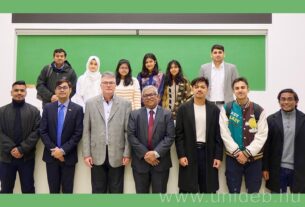More and more people are applying to the University of Debrecen: in the recently concluded admissions period, the number of people choosing this institution in the first place increased by 34 percent compared to last year, significantly exceeding the national average of 27 percent – explained the vice chancellor of education at the University of Debrecen.
Bartha Elek said that 19,676 people applied to the university, of which 11,351 were chosen first.
Most of them, 10,153, want to enter the state scholarship programs this time: 8,087 for bachelor’s education, 1,610 for master’s education, 1,293 for undivided education, and 360 for higher vocational education – detailed the professor, noting that the experiences of the past years according to 76-77 percent of the applicants are admitted to the university.
He added that most of the applicants applied for the faculties of economics, humanities, health sciences, child education and special pedagogy, 2.5 times as many as the previous year.
Based on the applications, nursing, patient care, psychology, trade and marketing, and law were the most popular this year – he explained, noting that among the master’s courses, there are also teaching courses, as well as psychology, health management, and human resource consulting. , health psychology and sports economics were the most popular this year.
Annamária Pósánné Rácz, the director general of education at the university, said that the changes in the admission requirements – the abolition of the minimum score and the advanced-level graduation – gave applicants more opportunities to choose a major.
In addition, the UD contacted high school students in a number of ways, in addition to direct meetings, on social media.
Their scholarship program, announced for the first time for first-year students, is also popular among applicants, said the director general.
Dániel Molnár, the president of the doctoral students’ self-government, added: prior to the admission procedure, the university’s faculty presented themselves in more than sixty secondary schools, and within the framework of the Teach for Hungary movement, more than a hundred of their students mentor a total of about a thousand elementary school students in disadvantaged small towns.
This year, with the cooperation of the students, a system of university ambassadors will be created, the “ambassadors” will introduce the University of Debrecen to future students at lectures in high schools and by organizing campus tours, he said.
MTI












